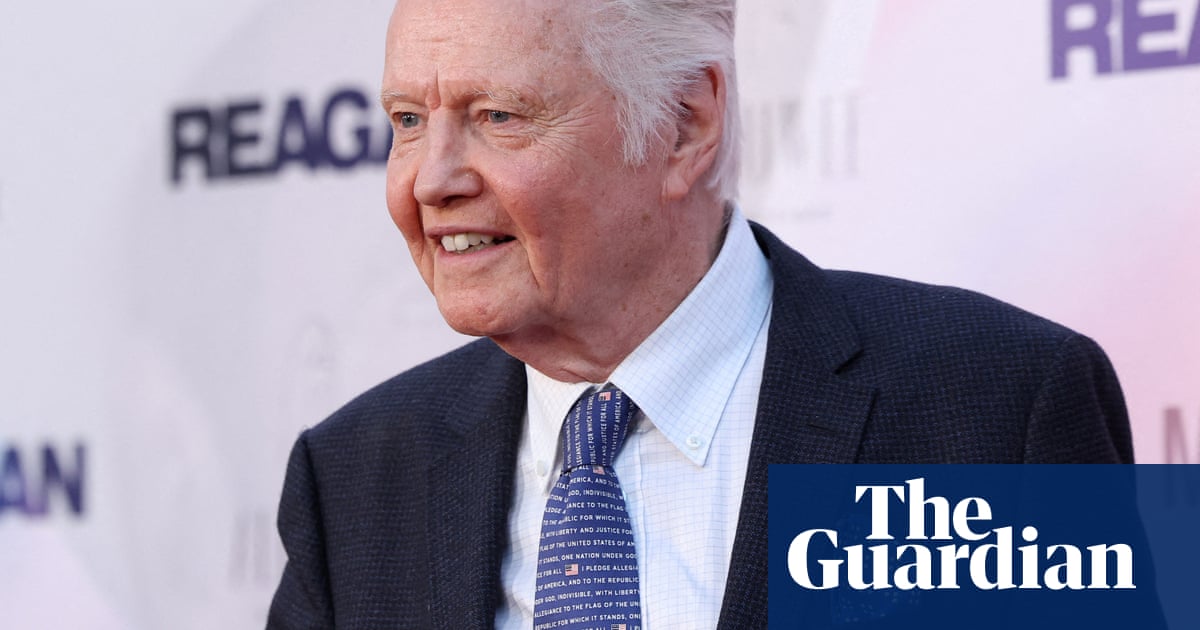Jon Voight, the actor whoinspiredDonald Trump’ssurprise statementabout placing a 100% tariff on foreign-made films, has given his first interview on the supposed plan to “give people back their dignity and their jobs”.
“Something has to be done, and it’s way past time,” the 86-year-old actor toldVarietywhile he was, according to the magazine, “driving through what sounded like a car wash”.
Voight, aformer leading man turned ardent Trump supporterwho was given the made-up designation of “ambassador to Hollywood” by the president, along with Sylvester Stallone and Mel Gibson, declined to provide specifics or logistics for the plan that has raised many eyebrows – and blood pressures – in the industry. He did describe the impetus for his plan, and his surprise at the negative reaction from across the industry. “How about enthusiasm and gratitude?” he said, insisting that the headlines did not square with feedback he received from unspecified others.
“We’ve gotten a lot of good response from people,” he told the magazine. “We’re really rolling up our sleeves and working. I think we have a good plan, and we’re just beginning. This little team of mine has worked very hard to try to figure out things. The union people and producers give their expertise and understanding to this problem, and we’re working together. A lot of people had a lot of input and we’re listening to everybody.”
On Sunday, Trump posted to official White House social media channels that he would institute a 100% tariff “on any and all Movies coming into our Country that are produced in Foreign Lands”, a day after meeting with Voight at Mar-a-Lago. The president has since clarified that he is “exploring all options” for revitalizing the US film industry.
Los Angeles has experienced a 40% reduction in film production over the last decade, according to FilmLA. Some of that business has gone overseas – to places like Canada, Australia, the UK, New Zealand, Hungary, Italy and Spain – in order to take advantage of local tax incentives, talent and landscapes that look similar enough to stand in for more expensive US locations. Other business has moved to states such as Georgia or New York, which offer generous tax incentives.
According to Voight, incentivizing a shift back to Hollywood would offer more jobs for the rank-and-file in the film business: makeup artists, costume designers and camera people left out of work when local crews are hired abroad.
“Every studio has a lot of smart people, and they have maneuvered the write-offs and the gifts that are being given out throughout the world to lure people to different countries. They take advantage of them,” Voight said of incentives provided by other countries that can save millions on a film’s budget. “Now we’re saying: ‘Hey, we have to have that here.’ Let’s have the level playing field. But really, we need more than that. We need to be competitive.”
Voight also noted that he thought Trump was treated “unfairly” by Hollywood. “There’s been a battle, but now it’s time to put that aside,” he said. “And I must say, in all of the interactions we’ve had [on addressing runaway production], politics has never come up. Never.”
The star of Midnight Cowboy, Catch-22 and Coming Home framed the current state of so-called runaway production as an existential threat to the US movie industry. “It’s come to a point where we really do need help, and thank God the president cares about Hollywood and movies,” he said. “He has a great love for Hollywood in that way. We’ve got to roll up our sleeves here. We can’t let it go down the drain like Detroit.
“This shouldn’t be political,” he added. “I don’t know the political identities of the people we’ve talked to. We’ve talked to a lot of people here. I don’t distinguish them on their party affiliation. And if we can come up with [a plan], he’ll back us. He wants us to be the Hollywood of old … If we all come together, I believe we have a bright future.”
Following outcry and confusion over the president’s tariff post, the White House walked back on Trump’s announcement, saying that “no final decisions on foreign film tariffs have been made”. Voight’s official proposal to Trump only suggests that tariffs would be used in “certain limited circumstances”. And it’s still unclear how tariffs would be applied to the highly collaborative business of film-making; Marvel’s new film, Thunderbolts*, for example, was mostly made in the US, but included location shots in Malaysia and a score composed in London.
Not all of the response from Hollywood has been negative. The US performers’ union Sag-Aftra said in a statement that it “supports efforts to increase movie, television and streaming production in the US” and that it would “advocate for policies that strengthen our competitive position, accelerate economic growth and create good middle-class jobs for American workers”.
